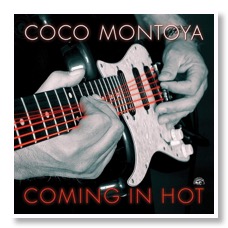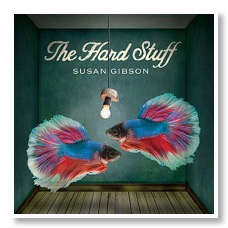September 2019
Album Cuts
Jedd Hughes
West
Self
Preceded by the single “Animal Eyes,” West fittingly describes Hughes’ love for roots music, particularly Americana and country music. Growing up in the Australian town of Quorn, he found favor with country music through his father via luminaries Johnny Cash and Marty Robbins, but the bluegrass-country hybrids of Ricky Skaggs – particularly the song “Country Boy” – really set the wheels in motion for a professional career. Furthermore, while attending college he met Terry McBride, the musician and songwriter best known for his work through Reba McEntire and Brooks & Dunn as well his critically acclaimed 1990s band McBride & The Ride; all these inspirations culminated in Hughes’ 2004 debut album Transcontinental.
Going back West, Hughes adds more rock music influences: the lead “Animal Eyes” reminds of the more string-laden 1990s alt-rock, with haunting string accompaniment and a melancholic vocal delivery. Drums, bass, and guitar affix “Killer” and “The Dreamer,” and synthesizer peppers “God Washed Up” and “Tweaker Town” (another Rodney Crowell collaboration), while the symphonic instruments violin, viola, and cello dominate the album. However, there is still the feel of a roots-laden ambiance; opener “Thinking About You” (co-written by Rodney Crowell) mines more country territory, and “Sleepless” has a more bare-bones production. The lyricism throughout the album is still down-home (the theme of love permeates “Back to You” and country-folk artist Guy Clark influences “Hollywood,” for example). Perhaps even more so than “Animal Eyes,” the forlorn instrumental title track best captures the combination of sounds: roots-driven guitar and orchestral outings in an expanding yet highly personal recording journey as singer, songwriter, musician, producer, and mixer, all found on this album.
by Jeff Boyce
 Coco Montoya
Coco Montoya
Coming In Hot
Alligator Records
Four decades of professional music haven’t slowed blues icon Coco Montoya. Montoya fills out his hard-boiled persona with something you wouldn’t expect: declared, wounded passion spilling right off his strings.
Montoya powers through most of the eleven songs on the album with characteristic guitar and vocal strength. His guitar-playing as ever is especially masterful, whether blaring in the title track or head-nodding in “Wouldn’t Want to Be You.” He sings with similar toughness, “I’m a survivor, I’m a straight-through driver, I ain’t no apologizer,” though Montoya’s voice becomes the first element of his music which softens. He sings tenderly here and there, asking, “Without you by my side, what am I?” He goes on to admit, “I’m a lonely man drowning in my feeling,” and the glimpse of reflection behind the rolling sound enhances both the inside and outside of Montoya’s musical image.
The rest of the band fills out the backdrop of the album with a reliable pace. Keyboardist Mike Finnigan gives a tingling energy at the edge of most every song, though he does hit a tease of a strong open in “Stone Survivor.” Tony Braunangel on the drums lends a steady center to every record, and rhythm guitarists Billy Watts and Johnny Lee Schell often give the songs a wavering, fun background. With this support, Montoya can soar up through a burning blues album. Coming In Hot will keep fans of Montoya’s prolific career, and it might also hook new listeners with its craft, passion, and fire.
by Kevin LaTorre
 Susan Gibson
Susan Gibson
The Hard Stuff
For the Records
Texas-based Americana singer-songwriter Susan Gibson is best known for penning the Dixie Chicks’ “Wide Open Spaces,” among the greatest country records of all time. While never matching that kind of success again, Gibson has still been able to churn out solo albums, including her seventh, preceded by the title track single. The Hard Stuff is just that - a personal testimony of life’s travails and triumph via perseverance and strength. And unlike previous albums of hers, this one takes in new musical approaches, embracing influences such as jazz and funk.
The country-dotted “Imaginary Lines” convinces that despite life’s categorizations, there is a oneness, a commonality, that shows no distinctions; it also serves as a metaphor for life’s journey. The steady “Hurricane” picks off the same country landscape. The title track, another highlight, employs funk-inflected horns. The infectious “Lookin’ for a Fight” conjures up violent imagery and brutal honesty of the common hardened man, whereas “The Big Game” describes the hunt for committed, almost-controlling love (“I tend to shoot before I aim,” “I want my way with you, do what I want you to”). “Diagnostic Heart” likens the hospital setting to the pain and hurt of heartbreak and relationship turmoil. On the upside, “2 Fake IDs” describes youthful innocence and romance, and the folk-strummed “Wildflowers in the Weeds” reads like a poem full of vigor in seeking personal betterment and attainment.
Draped in mellifluous vocals and evocative anecdotes, The Hard Stuff successfully merges common Americana and singer-songwriter themes with heartfelt sincerity. Gibson proves to be an exceptional storyteller as well, focusing on different situations that sum up a hard experience. After going through the loss of loved ones, The Hard Stuff encapsulates healing and growth.
by Jeff Boyce
West
Self
Preceded by the single “Animal Eyes,” West fittingly describes Hughes’ love for roots music, particularly Americana and country music. Growing up in the Australian town of Quorn, he found favor with country music through his father via luminaries Johnny Cash and Marty Robbins, but the bluegrass-country hybrids of Ricky Skaggs – particularly the song “Country Boy” – really set the wheels in motion for a professional career. Furthermore, while attending college he met Terry McBride, the musician and songwriter best known for his work through Reba McEntire and Brooks & Dunn as well his critically acclaimed 1990s band McBride & The Ride; all these inspirations culminated in Hughes’ 2004 debut album Transcontinental.
Going back West, Hughes adds more rock music influences: the lead “Animal Eyes” reminds of the more string-laden 1990s alt-rock, with haunting string accompaniment and a melancholic vocal delivery. Drums, bass, and guitar affix “Killer” and “The Dreamer,” and synthesizer peppers “God Washed Up” and “Tweaker Town” (another Rodney Crowell collaboration), while the symphonic instruments violin, viola, and cello dominate the album. However, there is still the feel of a roots-laden ambiance; opener “Thinking About You” (co-written by Rodney Crowell) mines more country territory, and “Sleepless” has a more bare-bones production. The lyricism throughout the album is still down-home (the theme of love permeates “Back to You” and country-folk artist Guy Clark influences “Hollywood,” for example). Perhaps even more so than “Animal Eyes,” the forlorn instrumental title track best captures the combination of sounds: roots-driven guitar and orchestral outings in an expanding yet highly personal recording journey as singer, songwriter, musician, producer, and mixer, all found on this album.
by Jeff Boyce

Coming In Hot
Alligator Records
Four decades of professional music haven’t slowed blues icon Coco Montoya. Montoya fills out his hard-boiled persona with something you wouldn’t expect: declared, wounded passion spilling right off his strings.
Montoya powers through most of the eleven songs on the album with characteristic guitar and vocal strength. His guitar-playing as ever is especially masterful, whether blaring in the title track or head-nodding in “Wouldn’t Want to Be You.” He sings with similar toughness, “I’m a survivor, I’m a straight-through driver, I ain’t no apologizer,” though Montoya’s voice becomes the first element of his music which softens. He sings tenderly here and there, asking, “Without you by my side, what am I?” He goes on to admit, “I’m a lonely man drowning in my feeling,” and the glimpse of reflection behind the rolling sound enhances both the inside and outside of Montoya’s musical image.
The rest of the band fills out the backdrop of the album with a reliable pace. Keyboardist Mike Finnigan gives a tingling energy at the edge of most every song, though he does hit a tease of a strong open in “Stone Survivor.” Tony Braunangel on the drums lends a steady center to every record, and rhythm guitarists Billy Watts and Johnny Lee Schell often give the songs a wavering, fun background. With this support, Montoya can soar up through a burning blues album. Coming In Hot will keep fans of Montoya’s prolific career, and it might also hook new listeners with its craft, passion, and fire.
by Kevin LaTorre

The Hard Stuff
For the Records
Texas-based Americana singer-songwriter Susan Gibson is best known for penning the Dixie Chicks’ “Wide Open Spaces,” among the greatest country records of all time. While never matching that kind of success again, Gibson has still been able to churn out solo albums, including her seventh, preceded by the title track single. The Hard Stuff is just that - a personal testimony of life’s travails and triumph via perseverance and strength. And unlike previous albums of hers, this one takes in new musical approaches, embracing influences such as jazz and funk.
The country-dotted “Imaginary Lines” convinces that despite life’s categorizations, there is a oneness, a commonality, that shows no distinctions; it also serves as a metaphor for life’s journey. The steady “Hurricane” picks off the same country landscape. The title track, another highlight, employs funk-inflected horns. The infectious “Lookin’ for a Fight” conjures up violent imagery and brutal honesty of the common hardened man, whereas “The Big Game” describes the hunt for committed, almost-controlling love (“I tend to shoot before I aim,” “I want my way with you, do what I want you to”). “Diagnostic Heart” likens the hospital setting to the pain and hurt of heartbreak and relationship turmoil. On the upside, “2 Fake IDs” describes youthful innocence and romance, and the folk-strummed “Wildflowers in the Weeds” reads like a poem full of vigor in seeking personal betterment and attainment.
Draped in mellifluous vocals and evocative anecdotes, The Hard Stuff successfully merges common Americana and singer-songwriter themes with heartfelt sincerity. Gibson proves to be an exceptional storyteller as well, focusing on different situations that sum up a hard experience. After going through the loss of loved ones, The Hard Stuff encapsulates healing and growth.
by Jeff Boyce


